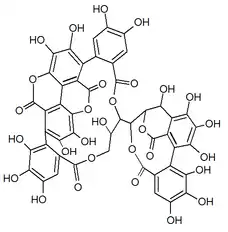 | |
| Identifiers | |
|---|---|
3D model (JSmol) |
|
| ChemSpider | |
PubChem CID |
|
| |
| |
| Properties | |
| C48H28O30 | |
| Molar mass | 1084.68 g/mol |
Except where otherwise noted, data are given for materials in their standard state (at 25 °C [77 °F], 100 kPa).
Infobox references | |
Punicacortein C is an ellagitannin, a phenolic compound. It is found in the bark of Punica granatum (pomegranate).[2] The molecule contains a gallagic acid component.
References
- ↑ CID 16129720 from PubChem
- ↑ Tannins and Related Compounds. XLI. : Isolation and Characterization of Novel Ellagitannins, Punicacorteins A, B, C, and D, and Punigluconin from the Bark of Punica granatum L. Tanaka Takashi, Nonaka Gen-Ichiro and Nishioka Itsuo, Chemical & Pharmaceutical Bulletin, 1986-02-25, 34(2), pages 656-663 (abstract)
This article is issued from Wikipedia. The text is licensed under Creative Commons - Attribution - Sharealike. Additional terms may apply for the media files.